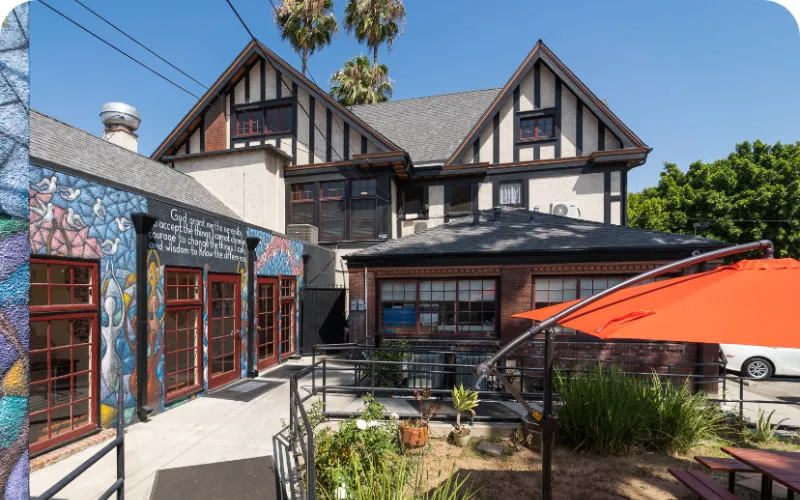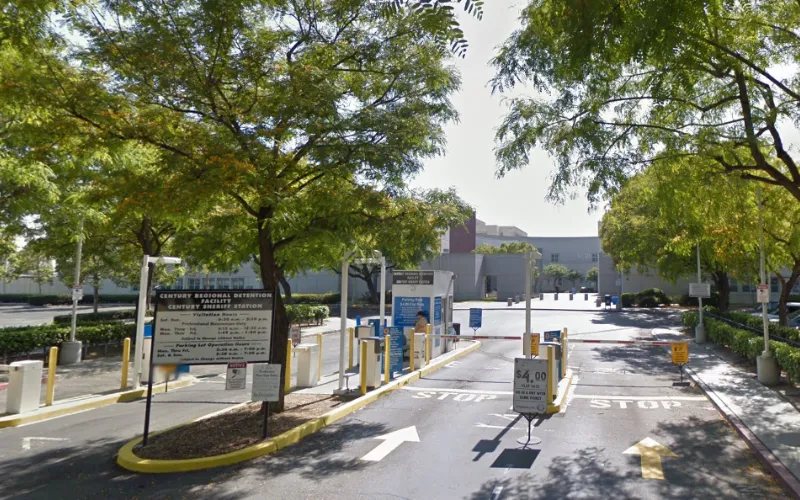Women-only programs provide a nurturing space for addressing addiction, mental health, or personal growth. These supportive environments foster connection and empowerment, allowing participants to heal and thrive in a community of peers.
Ads
More Info
Advertisement Disclosure
Our website is funded by advertisers who pay for prominently labeled placements.
Read More12 Rehab Centers were found
Filters
Locations
- Los Angeles(+98)
- Culver City(+14)
- Westlake Village(+13)
- Woodland Hills(+11)
- Beverly Hills(+10)
- Santa Monica(+9)
- Sherman Oaks(+7)
- West Hollywood(+6)
- Malibu(+5)
- Chatsworth(+5)
- Pasadena(+5)
- Encino(+5)
- Redondo Beach(+4)
- Lancaster(+4)
- Reseda(+4)
- Studio City(+4)
- Northridge(+3)
- San Mateo(+3)
- Lynwood(+3)
- Vernon(+3)
- Van Nuys(+3)
- Tarzana(+3)
- North Hollywood(+3)
- Glendale(+3)
- Gardena(+3)
- Riverside(+3)
- Granada Hills(+2)
- Shadow Hills(+2)
- Venice(+2)
- Orange County(+2)
- Pomona(+2)
- West Hills(+2)
- Valley Village(+2)
- Burbank(+2)
- Brentwood(+2)
- Long Beach(+2)
- Sun Valley(+1)
- Torrance(+1)
- San Jacinto(+1)
- San Pedro(+1)
- Upland(+1)
- Whittier(+1)
- Toluca Lake(+1)
- Thousand Oaks(+1)
- Simi Valley(+1)
- Mission Viejo(+1)
- Acton(+1)
- Beaumont(+1)
- Wilmington(+1)
- Panorama City(+1)
- Anaheim(+1)
- Laguna Hills(+1)
- Inglewood(+1)
- Alhambra(+1)
- Rosemead(+1)
- Maywood(+1)
- Manhattan Beach(+1)
- Monterey Park(+1)
- Claremont(+1)
- Covina(+1)
- La Puente(+1)
- Pico Rivera(+1)
- San Fernando(+1)
- Azusa(+1)
- Santa Fe Springs(+1)
- Glendora(+1)
- Agoura Hills(+1)
- El Segundo(+1)
- Duarte(+0)
- Sunland(+0)
- Downey(+0)
- Cudahy(+0)
- El Monte(+0)
- Compton(+0)
- Hermosa Beach(+0)
- Cerritos(+0)
- Calabasas(+0)
- Bellflower(+0)
- Bell Gardens(+0)
- Avalon(+0)
- Arcadia(+0)
- Altadena(+0)
- Paramount(+0)
- South El Monte(+0)
- Walnut(+0)
- West Covina(+0)
- Santa Clarita(+0)
- San Gabriel(+0)
- San Dimas(+0)
- Rolling Hills(+0)
- Orange(+0)
- Hawaiian Gardens(+0)
- Palmdale(+0)
- Norwalk(+0)
- Montebello(+0)
- Lakewood(+0)
- South Pasadena(+0)
- Carson(+0)
- Hawthorne(+0)
Conditions
- Drug(+278)
- Alcohol(+219)
- Mental Health(+195)
- Opioid(+193)
- Cocaine(+184)
- Trauma(+180)
- Methamphetamine(+177)
- Benzodiazepines(+174)
- Heroin(+173)
- Prescription Drugs(+159)
- Depression(+152)
- Anxiety(+149)
- Xanax(+145)
- Synthetic Drugs(+138)
- PTSD(+133)
- Adderall(+131)
- Marijuana(+112)
- Bipolar(+109)
- Ecstasy(+104)
- MDMA(+99)
- Behavioral Health(+93)
- LSD(+93)
- Psychedelics(+91)
- Fentanyl(+71)
- Stress(+71)
- OCD(+69)
- Personality Disorders(+63)
- ADHD(+61)
- Gambling(+38)
- Eating Disorders(+35)
- Anorexia(+34)
- Binge Eating Disorder(+34)
- Bulimia(+33)
- Schizophrenia(+32)
- Gaming(+28)
- Internet Addiction(+27)
- Sex Addiction(+25)
- Burnout(+23)
- Pornography(+22)
- Shopping(+10)
- Narcissism(+8)
Insurances
- BlueCross BlueShield(+129)
- Aetna(+126)
- Anthem(+105)
- Cigna(+105)
- United Healthcare(+66)
- Humana(+63)
- Optum(+53)
- Medicaid(+53)
- MHN(+51)
- Magellan Health(+47)
- Kaiser Permanente(+39)
- Medicare(+31)
- GEHA(+31)
- ComPsych(+29)
- Highmark(+25)
- AmeriHealth(+13)
- Tufts Health(+11)
- Oscar(+9)
- CareFirst(+9)
- Molina Healthcare(+8)
- Intermountain Healthcare(+6)
- Beacon Health Options(+2)
- UMR(+2)
- NYSHIP(+2)
- ILWU(+2)
- Geisinger(+2)
- Empire Life(+2)
- Empire BCBS(+2)
- Bright Health(+2)
- GuideWell(+1)
Therapies

$3,200 - 30 days

N/A

$1,000

Call for Rates - 30 days

20
Women’s Rehab Programs: Empowerment and Specialized Understanding
Women’s rehab programs deliver targeted services that recognize the biological, emotional, and social issues unique to women in addiction recovery. By integrating trauma-focused treatments, hormonal-health considerations, and community-based support, these programs help women rebuild self-worth, recover from trauma, and maintain enduring sobriety.
Why Gender-Focused Rehab Is Vital
Women may experience multiple hurdles when it comes to seeking treatment—such as caregiving duties, social stigma, or past traumatic events. Gender-specific environments offer a safe space for women to candidly address matters like domestic abuse, postpartum struggles, or societal pressures. Evidence suggests that women-only rehab fosters more meaningful engagement, stronger peer bonds, and better long-term outcomes than mixed-gender alternatives.
Hormonal Balance and the Recovery Journey
Hormonal changes—during menstrual cycles, pregnancy, or menopause—can heavily influence both addiction vulnerability and recovery paths. For instance, high levels of estrogen can amplify the pleasurable effects of substances like alcohol, heightening dependence risks. Conversely, progesterone can alleviate stress and curb cravings, offering some protective benefits, especially during pregnancy. Elevated cortisol tied to chronic stress or postpartum life transitions can also trigger relapse.
Effective women’s rehab addresses these factors through targeted care plans, hormone replacement therapy (HRT) for menopausal women, and medication-assisted treatment (MAT) that helps stabilize hormonal processes linked to addiction.
Core Elements of Women’s Rehab
Trauma-Focused Approaches
Many women enter treatment with a background of trauma, addressed through evidence-based interventions such as cognitive-behavioral therapy (CBT) for managing destructive thought patterns, dialectical behavior therapy (DBT) for emotional control, and trauma-focused group sessions that nurture mutual trust and collective healing.
Holistic Wellness
Numerous programs integrate yoga, meditation, and nutritional guidance to relieve stress, rebuild physical well-being, and educate clients on reproductive health. These measures ensure women have the resources necessary to maintain sobriety during pregnancy, menopause, or other life transitions.
Peer and Community Support
Group therapy promotes understanding around shared obstacles—like motherhood in recovery or dealing with workplace discrimination. Alumni programs and peer mentorships sustain commitment and connection well beyond formal rehab.
Benefits of Women-Centered Treatment
- Safe, Trusting Space: Single-gender settings reduce triggers for trauma survivors, fostering full participation in therapy.
- Empowerment Initiatives: Programs focus on crucial life skills (e.g., financial literacy, career planning, boundary-setting) to restore self-reliance.
- Integrated Mental Health Care: Since most women in rehab have concurrent conditions (anxiety, depression, or PTSD), specialized interventions treat both addiction and mental health needs simultaneously.
- Relapse Prevention: Workshops emphasize recognizing environmental or hormonal triggers, as well as equipping women with coping methods like mindfulness and crisis planning.
Selecting the Right Program
Verify Accreditation: Opt for programs that employ licensed professionals experienced in women’s addiction treatment, certified by bodies like CARF or The Joint Commission.
Personalized Options: Look for adaptable offerings, such as residential care for severe cases or outpatient (IOP) plans for those balancing work or family responsibilities.
Aftercare Resources: A strong post-treatment foundation—alumni networks, sober living support, or continued counseling—plays a crucial role in preventing relapse.
Redefining Strength in Recovery
Women’s rehab programs reinterpret seeking assistance as an act of courage, not shame. By taking into account biological, emotional, and societal dynamics, these services empower women to reclaim control over their lives. As one participant reflected, “Recovery isn’t about achieving perfection—it’s about showing up for yourself, even on the hardest days.”
Moving Forward
If you or someone you care about needs help, explore women’s rehab programs that emphasize trauma care, hormone management, and community connection. Our directory offers vetted listings featuring evidence-based methods, experienced staff, and comprehensive aftercare solutions.
For immediate help, call our 24/7 helpline or check out our verified list of women’s rehab facilities today.
Frequently Asked Questions
Are women’s rehab programs appropriate for survivors of trauma?
Is it possible to find options that support mothers with children?
Which holistic treatments are commonly found in women’s rehab?
Can pregnant or postpartum women receive treatment?
Ads
More Info
Advertisement Disclosure
Our website is funded by advertisers who pay for prominently labeled placements.
Read More







































